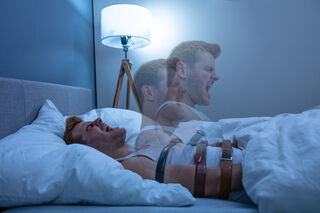Sleep
Why Sleep Paralysis Happens (and How to Prevent It)
Sleep paralysis can be scary, but there's a scientific explanation for it.
Posted October 22, 2020 Reviewed by Matt Huston
You wake up out of a murky sleep and find that you’re unable to move your body, from your forehead all the way down to your little toe. You’re completely paralyzed! You also have a crushing feeling in your chest, as if something heavy is sitting on it, and an uneasy sense that someone's in the room with you. Your heart pounds and your thoughts spiral as you silently scream inside.
Is this a scene from a great horror movie or something more ominous?
What is sleep paralysis?
Varying cultures have explained this frightening experience in various ways. In Brazilian folklore, a crone with long fingernails skulks on roofs and tramples on sleepers’ chests. In Japanese mythology, vengeful spirits come to suffocate their enemies while they sleep. In contemporary American culture, sleep paralysis has taken on the mythology of alien abductions—sleepers wake up feeling the presence of aliens in the room while experiencing zapping sensations and a feeling of suffocation.
But it turns out this isn’t a slasher flick and you’re not experiencing a haunting. All of these symptoms describe sleep paralysis, a sleep disorder (or symptom of a sleep disorder) that temporarily alters a person’s mobility, perception, thinking, and emotional state during the transition between sleeping and waking.
Sleep paralysis is a fairly common experience—almost 8% of the general population has experienced it at least once. But if you’re a student or someone with a psychiatric diagnosis, your chances of experiencing it go up to almost 1 in 3.
Rest assured, sleep paralysis is usually harmless, especially if it only happens rarely. But why does it happen at all, when is it cause for concern, and how can you prevent it?

Why does sleep paralysis happen?
You’re typically not aware of it, but the “paralysis” part of sleep paralysis actually happens every night when you sleep during rapid eye movement (REM) sleep.
REM sleep is often referred to as a stage of sleep that takes up 20-25% of your typical night. It occurs in a few chunks, mostly during the second half of the night. During REM, your brain is actually quite active—the electrical signals from the brain look almost like they do when you’re awake. This is also when most dreaming happens, along with a lot of emotional processing that the brain does behind the scenes.
While your brain waves may be very active, your body is immobilized during REM. Other than the eyes moving around a lot (hence “rapid eye movement”), your muscles lose tone. This is your body's way of preventing you from acting out your dreams.
So, every night during REM, you are “paralyzed.” Sometimes, though, the veil between sleep and wakefulness becomes thin and you find yourself straddling both at the same time. Suddenly, you’re awake and helpless while you hallucinate and process emotions. Often, this also comes with a racing heart, fear, and sometimes even a feeling of impending death. No wonder people around the world have mistaken sleep paralysis for a demonic attack!
What makes some people more prone to sleep paralysis?
The good news is that sleep paralysis is usually innocuous. It’s simply a temporary blunder in the sleep-wake brain system that failed to transition you completely from sleep to wakefulness. If it only happens rarely to you, you don’t need to worry.
Narcolepsy
For those with narcolepsy, a sleep-wake disorder that disrupts a person’s ability to stay awake, sleep paralysis can be a regular experience. Often, narcolepsy comes with not only sleep paralysis when waking, but also hallucinations as one is falling asleep (called “hypnagogic hallucinations”), suddenly falling asleep or losing muscle tone during the day, and having poor nighttime sleep quality. If you experience these symptoms, you should ask your doctor for a referral to a sleep study.
Anxiety and trauma-related disorders
If you experience an anxiety disorder, like panic disorder or social anxiety, you may be at higher risk for sleep paralysis. Having experienced trauma or having post-traumatic stress disorder (PTSD) also makes a person more likely to have sleep paralysis.
Being a student
Sorry, students—you have about a four-fold higher risk of experiencing sleep paralysis. It’s not clear whether this is because people in their late teens and early twenties are more prone to sleep paralysis or because students have lifestyles—complete with all-nighters for studying, periods of high stress, and a higher likelihood of binge drinking or recreational drug use—that disrupt sleep and can make sleep paralysis more likely.
How to prevent sleep paralysis
If you have a medical or psychiatric disorder that makes sleep paralysis more likely, such as narcolepsy or an anxiety disorder, getting treatment for that disorder is the most important thing to do. But if that’s not the case, here are a few things you can do to improve your sleep and decrease your chances of having sleep paralysis:
1. Keep a consistent sleep-wake schedule and get enough sleep.
Sleep paralysis tends to happen when your sleep schedule is disturbed or you’re sleep deprived. If the brain repeatedly does not get enough REM sleep, it’s going to be deprived of this important sleep process. The next time you drift off to dreamland, your brain will try hard to make up the deficit by jumping into REM more quickly than usual and producing more intense brain activity. This makes it more likely for you to have an incomplete transition between REM and wakefulness, and therefore more likely to have sleep paralysis.
This “REM rebound” can happen when you’re consistently not getting enough sleep, or your circadian rhythm is thrown off by jet lag, shift work, or not sticking to a regular sleep-wake schedule.
So, how to combat this? Start by deciding on a consistent time you can get up each morning (including weekends, with no more than an hour’s wiggle room to sleep in) and set an alarm for that time. Get up with the alarm even if you didn’t sleep well that night, and go to bed in the evening when you’re feeling sleepy. After a few days or weeks of staying consistent with your wake-up time, your body will adjust and make you feel ready for bed at around the same time every night.
2. Practice relaxation or meditation.
According to one recent study, relaxing the body and mind may reduce or even eliminate sleep paralysis. This thought process is based on the idea that sleep paralysis and panic symptoms form a vicious cycle in the moment, and that shifting your attention away from the terrifying visions and body sensations will interrupt this cycle and get you back to relaxed sleep.
The technique involves having a few pleasant internal things to focus on during a sleep paralysis episode, such as a nice memory, and consciously trying to relax your muscles. This brings the relaxation system online and dampens the fight-or-flight system.
3. Limit alcohol and drugs and review your medications with your doctor.
Some medications can disrupt REM sleep, including many antidepressant medications and medications prescribed for insomnia, and there are substances, such as alcohol, that may disrupt sleep and contribute to REM rebound. Generally, it’s a good idea to minimize alcohol and recreational drugs, especially at night. It’s also worth reviewing your medications with your doctor to see if one of them may be contributing to sleep paralysis.
4. Get cognitive behavioral therapy for recurrent isolated sleep paralysis (RISP).
If you frequently experience sleep paralysis but you don’t have consistently poor sleep, narcolepsy, or medications that disrupt REM, you may have recurrent isolated sleep paralysis (RISP). Simply put, this means that you have sleep paralysis much more often than you should, and there is no clear reason for it.
In this case, you may benefit from cognitive behavioral therapy (CBT) for recurrent sleep paralysis, which would include learning techniques for disrupting the sleep paralysis episode in the moment, along with relaxation practice, skills for coping with hallucinations, and healthy ways to think about sleep paralysis attacks that don’t feed into the experience.
There’s a reason most of us look forward to bed after a long day—sleep is supposed to be a sweet, relaxing experience, so it’s not only frightening but also frustrating to have it interrupted by sleep paralysis. But at least now you know it’s nothing to be afraid of in and of itself!
Just make sure to practice good sleep habits, hone your relaxation skills, and limit substances that could be messing up your sleep. And if sleep paralysis happens again, shake it off (when you fully wake up) and chalk it up to your brain playing with the boundary between being asleep and being awake.
A version of this article titled Ghosts in Your Bedroom?—It's Probably Sleep Paralysis was published on Quick and Dirty Tips.




